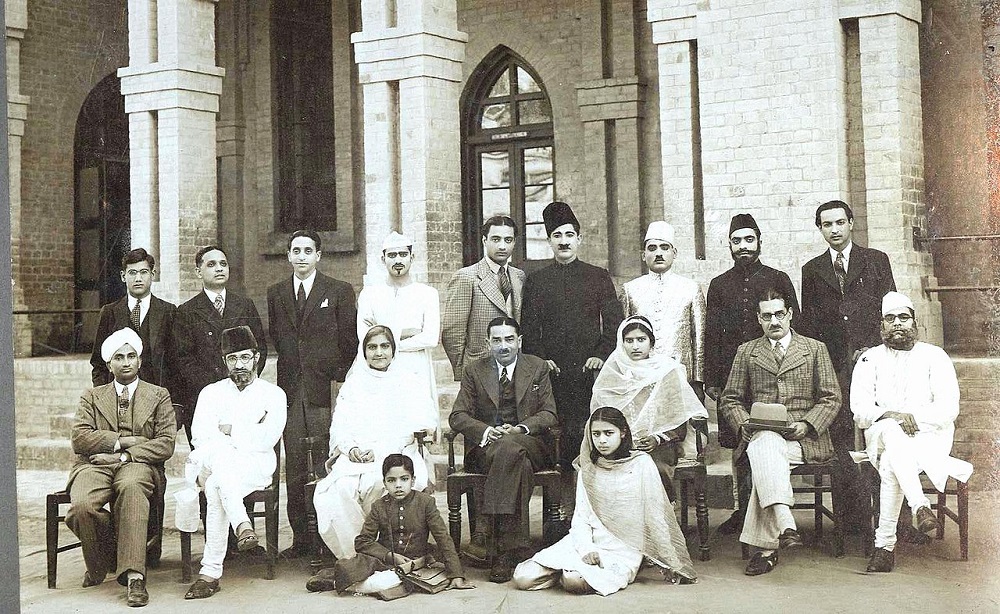Written by: Muhammad Suhayb
Posted on: October 15, 2021 | 
Zia Mohyeddin in a scene of famous British historical film 'Lawrence of Arabia' (1962)
In Urdu ‘harf-e-aakhir’ (the last word), is something which is considered to be the decisive and final authority on any particular thing or topic. Zia Mohyeddin, whose name starts with Z (the harf-e-aakhir in English language) is a harf-e-aakhir (final authority) in acting, hosting, recitation and direction. There are seldom such personalities, who are equally brilliant on and off the stage, Zia Mohyeddin is one of them.

A picture of the late 1930s where the young Zia Mohyeddin in his teens can be seen in the front row with a bag in hand
Born in Lyallpur in 1931, Zia Mohyeddin spent his early life in undivided Punjab. His father, Khadim Mohyeddin, was a playwright and a teacher, who let the child develop his interests unhampered, which helped him grow into Pakistan’s renowned orator and actor. Zia graduated in 1949 from Government College, Lahore (GC) and started professional life as a broadcaster on Radio Pakistan. He moved to Radio Australia, and later to the British Broadcasting Corporation (BBC). In 1953, he got admission in London’s Royal Academy of Dramatic Arts (RADA), from where he graduated in 1956. The RADA has produced acting giants like John Gielgud, Anthony Hopkins, Richard Attenborough, Kenneth Branagh and Tom Hiddleston.
Zia Mohyeddin returned to Pakistan and directed stage plays in Karachi, which was still the capital of the newly formed state. He acted, directed and produced plays in Urdu and English and desperately tried to establish serious theatre in Pakistan, but a lack of audience forced him to abandon his plans and return to the UK, this time on a British Council scholarship.
After roles in Eugene O'Neill's Long Day's Journey into Night, considered one of the finest American plays of the 20th century, and Shakespeare’s Julius Caesar, Zia made his West End debut in ‘A Passage to India’ in 1960. His role as Dr. Aziz was widely appreciated, and he was launched as a lead actor. He also became the first Asian to have his name up in lights in the West End and on Broadway, New York. In the audience watching A Passage to India was British film director David Lean, who was finalizing the cast for Lawrence of Arabia. He selected Zia for the role of Tafas, Lawrence’s guide, for the movie that was released in 1962.
Zia featured with Gregory Peck in Behold a Pale Horse (1964), Charlton Heston and Sir Laurence Olivier in Khartoum (1966), with Orson Welles in Sailor from Gibraltar (1967) and with actor/producer Shashi Kapoor in Bombay Talkie (1970). He also worked in many TV series, such as The Avengers and Man in a Suitcase.
Zia returned to Pakistan and starred in the suspense thriller film, Mujrim Kaun (1970). Directed by a newbie Aslam Dar, the film failed as people could not accept someone whom they had seen in English films wooing a local heroine (Rozina). Zia acted in his natural and professional style, but the presence of awaami actor Alauddin, star-to-be Sultan Rahi and the comedian Rangeela, confused the viewers. The songs from the movie, aaj main ne pi hai gulaabi (Ahmed Rushdi), honton pe tabassum nazar sehmi sehmi (Mala and Ahmed Rushdi) and mere mehboob mere pyar ke qabil (Mehdi Hassan) are still popular numbers. He also acted with Nadeem and Shamim Ara in Fareed Ahmed’s Suhaag (1971), which had moderate success.
Aslam Azhar, the General Manager at PTV’s Karachi Television Centre, wanted a weekly program like The Dean Martin and Bob Hope show of NBC Network. He convinced Zia Mohyeddin to create a show that changed the dynamics of talk shows in Pakistan. The show was telecast in 1971 and 1973, and ended only when Zia became director of the PIA Arts Academy.
With the seizure of power by another Zia and the imposition of martial law, the talented Zia left Pakistan and returned to England, where he remained till the mid-90s. Zia Mohyeddin directed Here Today, Here Tomorrow, one of the earliest programs on British TV about the plight of the Asian community in 1979. The film led to the famous weekly show, Central Television’s Here and Now, which Zia presented for quite some time.
He returned to Pakistan in the mid-90s and relaunched the Zia Mohyeddin Show for PTV. He failed to get a suitable audience via TV, but became famous for his reading sessions in Lahore. Zia adapted the discipline of the Western genre of ‘reading’, to Urdu prose and poems. Poets and writers like Ghalib, Faiz, Noon Meem Rashid, Shaukat Thanvi, Ibn e Insha and Patras Bokhari were introduced to the youth by the ‘unique’ reading style of Zia. ‘An Evening with Zia Mohyeddin’, had become an annual fixture in Lahore, where the thespian was seen delighting audiences with his recitation sessions for years.
President of Pakistan, General Pervez Musharraf set up a National Academy of Performing Arts in the year 2004. The Academy (NAPA) was inaugurated in 2005, with Zia appointed as its Chairman and CEO. He remained in that position till 2021 and was recently elevated as the President Emeritus of the Institute. The Academy has produced many talented people over the years, who are working in ads, films and TV serials. Even at 90, Zia Mohyeddin is working with the energy of a 45-year-old. He has enthralled audiences with his recitations, is an authority on voice overs, and is still very active in directing theatre plays. He personifies the best that Pakistan has produced in theatre, whether in the field of acting, directing and recitation.
You may also like: